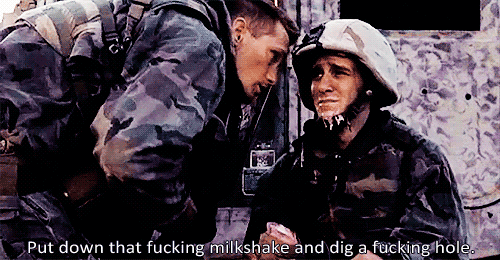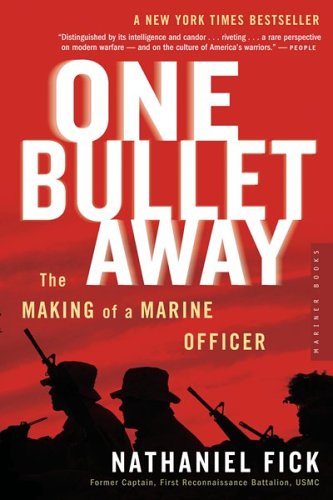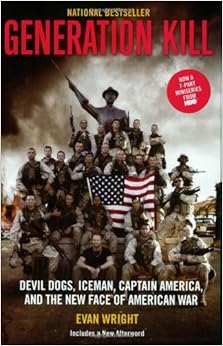If you have not read Part One, do so first by clicking on the link.
Evan Wright’s Generation
Kill, HBO’s Generation Kill and
Nathaniel Fick’s One Bullet Away all
look at the USMC 1st Recon’s Bravo Company during the invasion stage
of Operation Iraqi Freedom. Being a specific platoon within a rather specific
branch of the military means these three different sources heavily overlap one
and other, especially seeing as HBO’s series is based on Wright’s book, which
in turn mostly focuses on the platoon Lieutenant Fick commanded. Using a text
analysis tool known as Wordle, my goal is to look at, examine and compare the
quantity of use of different words in from each source. Here are just a few of
the results I gathered.
So what can we make out of these three clouds of words, I
mean we know that the bigger the word is, the more frequently it was used in
the text (of course having ruled out the common words of the English language –
a feature automatically provided by the tool) and in total we have 150 words
from each text. In order to really analyse the meaning of the cloud, you are
going to have to read the books and watch the series (for a total of seven
hours of film and 840 pages). Fortunately, as I have done this already, I can
save you some time.
 |
| Evan Wright's Generation Kill |
 |
| HBO's Generation Kill |
 |
| Nathaniel Fick's Generation Kill |
- Marines
- Colbert/Colbert's
- Humvee
- Men
- Person, Fick, Team
- Recon
- One
- Fire
Some Key Words for HBO
- Fucking/Fuck/Shit
- One/Two
- Fick
- Hitman
- Sir
- Roger/Copy
- Get/Just/Got (surprisingly some is not as large)
- Marines/Marine
- Platoon/Batallion/Team
- One/Two
- Around/Along/North
- Men
- Sergeant
- War
- Time
- Highway
Let’s start with the biggest word in both Wright and Fick’s books, Marines. Followed by a not too distant singular marine, this word occurs the most because it is easiest way for the authors to provide a title to the men they are working/serving with and writing about. Using other words such as soldier to describe the men doesn't really occur in the books due to the elitism of the marines, especially recon marines, who are in a class of their own when it comes to combat and combat training. Each time the author, who is talking about the time spent with the marines, wishes to talk about more than one of the men they are with, or they do not know the name of a specific member of this military unit, they use the word marine. Even if you were to take this blog article, chances are marine will be one of the most common words. But why isn't it of as high usage in the series if it’s so popular in the books? Simple, you can see everything the author is describing. We don’t need someone to say the marines did this or that, we simply know by observing their actions.
One and Two. Why, they are numbers, numbers that
when we think of why they would be used, it would be for one thing, describing.
There are two unarmed men approaching our position, hold your fire; serves as
an example of what we would expect two to
be used for. But why do we see it so much, how many times can writers describes
things in single/double groupings. The answer lies in communications.
Throughout the invasion the marines rely heavily on radios to keep in constant
contact with one and other, especially since they are in separate hummers. Evan
Wright rides in the hummer code named Hitman-Two-One, and Fick Hitman Two. So
every time a hummer’s call sign comes over the radio it is recorded into the
transcript as the radio plays an important role in the series. But from this
yet another question rises, why does Fick’s book have a high use of One and Two yet Wright’s does not? The answers this time lie with the
writer. To Fick these call signs are like a spoken language that he is fluent
in, and would use liberally as his book is directed more towards a military oriented
audience. Wright’s materials are direct towards the general public, so he uses
the names of the marines more frequently than he would the call signs to avoid
confusion and allow for a better connection (names being more personable than
Hitmen and numbers).
 The last, and to us possibly one of the words our eyes are
most rapidly drawn to when looking at fucking. Fuck, fucking and further down the line, motherfucker
(bottom of the cloud, centered) are used quite frequently in the mini-series,
but in Fick’s book its rarely used (as in not on the cloud) and in Wright’s
book you have to search to find it (fucking is located by the S in marines).
Why? The answer is essentially the opposite of what it was for marines. In the books most of the focus
is on describing and in comparison, a very little number of words go towards
dialogue; in the film everything is dialogue. Fick admits in his text and is
described by Wright in his book as someone who does not swear a lot, which
explains why there is a lack of profanity in One Bullet Away. The Generation
Kill book/series have this increase in profanity due to the fact that you
are learning about men who are well, rather foul mouthed; and in several cases,
its rightly so.
The last, and to us possibly one of the words our eyes are
most rapidly drawn to when looking at fucking. Fuck, fucking and further down the line, motherfucker
(bottom of the cloud, centered) are used quite frequently in the mini-series,
but in Fick’s book its rarely used (as in not on the cloud) and in Wright’s
book you have to search to find it (fucking is located by the S in marines).
Why? The answer is essentially the opposite of what it was for marines. In the books most of the focus
is on describing and in comparison, a very little number of words go towards
dialogue; in the film everything is dialogue. Fick admits in his text and is
described by Wright in his book as someone who does not swear a lot, which
explains why there is a lack of profanity in One Bullet Away. The Generation
Kill book/series have this increase in profanity due to the fact that you
are learning about men who are well, rather foul mouthed; and in several cases,
its rightly so. these clouds, is
The moral of the story here is everyone should watch this
mini-series as it tells a phenomenal story, just don’t watch it with your
little cousin, brother, sister, that kid you are babysitting, or your parents
if they give you a disapproving scowl every time you say dammit. And if you
have an interest in combat, military of history firsthand accounts give Fick
and Wright’s books a read, you won’t regret it. Stay Frosty.




